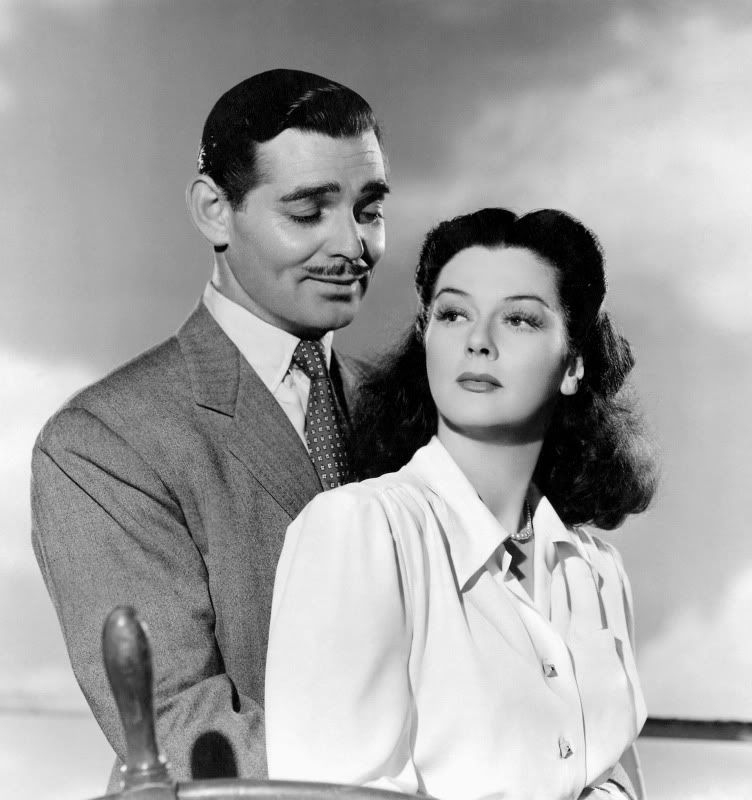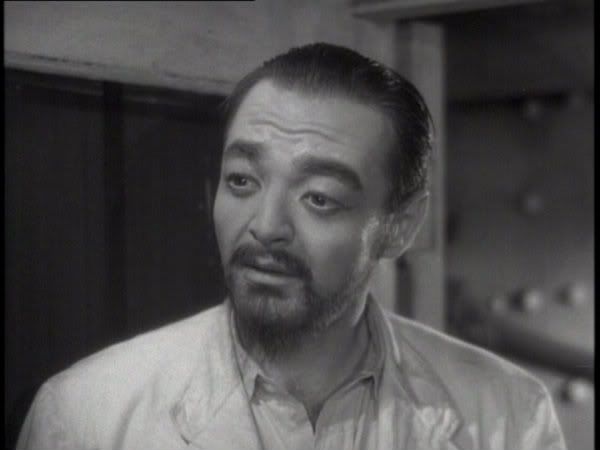
It’s a crapshoot looking at lesser known studio films. Occasionally you find a diamond in the rough, or even a sleeper classic. More often you stumble across mediocrity. I can’t say They Met in Bombay is really bad. I’d like to think it’s the worst film I’ll watch in my quest to view previously unseen Peter Lorre movies, however.
There were several factors to the good going into this. First, Clark Gable is an enjoyable actor, and reminiscent of the days when movie stars really did seem outlandishly handsome or beautiful. Gable was certainly that, in a way that today’s pretty boy actors can never approach. And if I was never really a fan of Roseland Russell, she was a star, and thus another indication that this film wasn’t a tossed-off B outing. Finally, it apparently fell into the “lovably roguish thieves” genre, which I rather enjoy.
Finally, Peter Lorre was listed third in the credits. This indicated he would have a juicy and/or substantive part, rather than a ‘there he is and there he goes’ sort of character actor appearance.
Sadly, this proved instead to be a bit of bait and switch. More on that later.
The movie is quite disjointed, with the tone of the action being all over the place and noticeably shifting several times. In the beginning, Gable and Russell are suave thieves currently in India, each independently after the diamond McGuffin of a typically comically imperious old noblewomen. The early tone is often very broad indeed, with lots of mugging from Russell and the supporting cast.
One scene is particular, with Russell attempting to book a dinner table near her target, is just painful. As the hotel staff reacts in ‘hilarious’ exasperation to her ‘comically’ inane reasons for rejecting a more remote series of tables, you just wince. You can pull off this sort of antic comedy, as Cary Grant did in Arsenic and Old Lace. It’s a bit of a soap bubble, though, and nobody here, neither the actors nor the director nor the composer of the COMEDY! music, remotely evince such chops.
Gable and Russell’s respective ‘plans’ to steal the McGuffin both seem like something a disinterested fifth grader would come up with. Russell’s scheme is basically to get the old woman drunk and then snatch the artifact while she’s sleeping. And then…I don’t know, leave the hotel and get out of town, I guess.
Given the set-up, you expect the entire film to be about the pair’s increasingly sly efforts to defeat the wily old battleaxe, while also attempting to block the other from doing the same. Sadly, no. The job is all too quickly accomplished, and rather boringly so. Trouble in Paradise this ain’t, and director Clarence Brown—whose work here is as stolid as his name—certainly ain’t no Ersnt Lubitsch. We do get a bit of the two conning each other, but this is quickly gone by as the two fall in love (for a high end thief, Russell sure plays her part as a moon-eyed naïf) while attempting to escape capture.
Gable doesn’t seem fully engaged either. Indeed, he’s a peculiar choice for a sophisticated, international man o’ mystery. Gable’s forte—Rhett Butler notwithstanding—was sarcastic blue collar types, not tux-wearing Simon Templer wannabes. His clipped manner of speaking alone suggests a directness of character out of line with his role here. (Not to mention that it also makes him an odd choice to play a Canadian, which proves necessary for the plot.) Surely Cary Grant or William Powell would have been a more natural choice. Although really, those two could have starred in almost anything.
The love stuff is somewhat more tolerable than the earlier comedy was, if only because it mostly involves the two stars, and thus avoids the exaggerated antics of any supporting actors. Also, there’s the tension of them being on the run, which is at least something. It’s still not very good, though. Gable and Russell don’t have a lot of natural chemistry, and notably never starred opposite each other again.
In any case, I was pretty glad when, during the ‘on the lam’ section of the film, we finally got to Lorre. He plays a Chinese (!) cargo ship captain who takes the two fugitives on board. Unsurprisingly, being Peter Lorre, he plans to betray them for his own profit. Despite Lorre’s prominent billing, he indeed only appears in this middle section of the film, which runs maybe ten minutes of the 92 minute running time. Then he’s left behind and doesn’t return. Damn you, deceptive billing!

Presumably because of his diminutive size and black hair (and that alone), Lorre was often cast as Asians. Most famously he played the heroic Japanese detective Mr. Moto in a pre-war series of films, as well as a more evil Japanese sort in the wartime Invisible Man sequel Invisible Agent. Even so, his casting here seems rather bizarre.
Partly this is because Lorre seldom tried to ‘Asian’ up his performance when playing these parts, ala the various Caucasian actors who played Charlie Chan. His soft, German lisping mode of speaking certainly isn’t disguised at all here, creating a bit of a dissonance with his prosthetic make-up job. All his crewmen, by the way, are played by real Asians. As usual in such cases, you wonder what they made of it all.
The worst thing, however, is that Lorre is strangely subdued here. You love the guys for his outsized charisma and impishly bald attention-grabbing antics. Here, though, he’s just kind of drab. It’s certainly the most lackluster Lorre performance I’ve seen from him at this stage in his career. Later when he was old and fat and disgusted with the parts he was getting, sure. This early, not so much. Don’t get me wrong, his appearance is still one of the film’s highlights. But that’s damning with faint praise, right there.
If I may prompt a bit of conspiratorial theorizing, I’ll just note that a) Clark Gable had just worked with Lorre the year before in Strange Cargo, and thus would presumably have been aware of Lorre’s screen hogging proclivities*, and b) that Gable presumably had major pull with director Brown, as the two had made a good half a dozen movies together before this one. In any case, Lorre’s rather subdued performance suggests to me his being sat upon by the director.
[*I haven’t watched Strange Cargo yet, but I got the DVD in, so I’ll see if this bears out.]So Lorre indeed comes and goes, and then all of the sudden the film abruptly turns into a patriotic war picture, with Gable rather implausibly finding himself leading a squad of troops in battle against some Japanese soldiers. Things naturally end with the leads forsaking their sordid pasts to pursue a nobler future blah blah blah.
Again, this probably makes the movie sound awful, which it isn’t. Still, I can’t say a single element of the movie really stands out as particularly enjoyable, not even Lorre. I guess the battle scene is pretty good, although not especially so, and moreover it’s hard to get past the feeling that you don’t know how the film got there from where it started. Here’s to better stuff next week.
